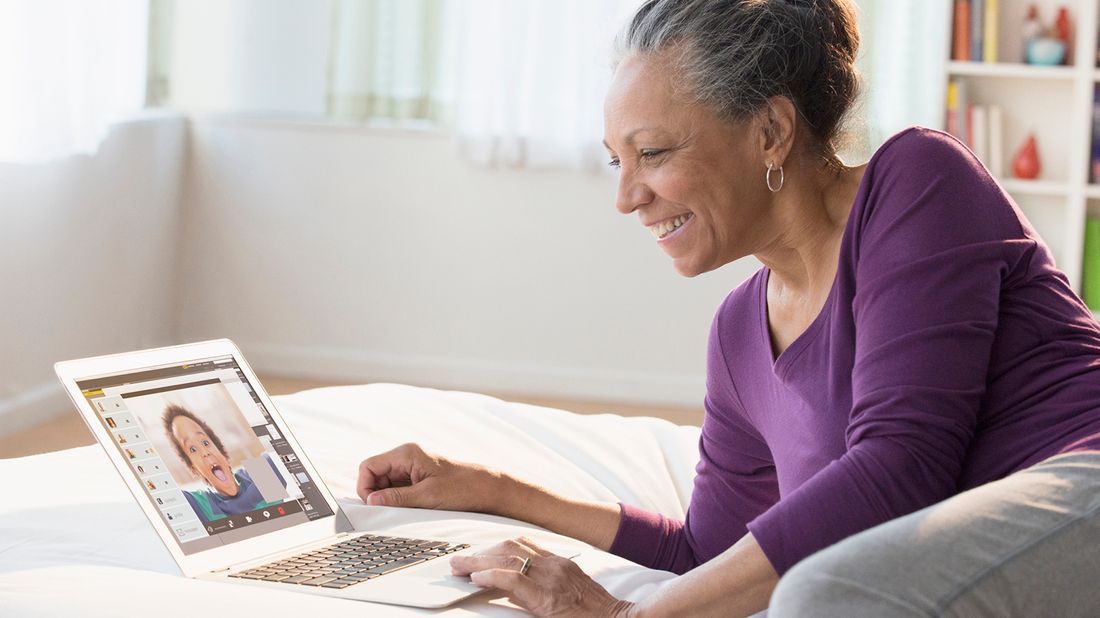How to Remain Connected With Parents or Grandparents When You Can't See Them in Person

Social distancing is now a part of everyone’s vocabulary. And while it's hard for all of us to figure out how to pass the time or interact with others safely, it can be especially difficult for seniors who haven’t been able to see friends and family because of their increased vulnerability to the novel coronavirus. Those in nursing homes may have it especially tough as visits have been curtailed or forbidden.
If you have an older loved one in your life — or you are a parent or grandparent who isn't expecting to see your family for a while — here are some tips to remain connected and keep them close in spirit, even if you can’t be there in person.
CALL FREQUENTLY
“Don’t underestimate the power of a phone call,” says Jennifer L. FitzPatrick, a gerontology instructor at Johns Hopkins University and author of “Cruising Through Caregiving: Reducing the Stress of Caring for Your Loved One.” But because many of us aren’t doing much outside the home these days, it may be hard to come up with topics to discuss. FitzPatrick suggests reading a book or watching a favorite TV show or movie together over the phone. You could also do fill-in-the-blank stories or use “table topics”-type questions to spark conversation.
SET UP A FAMILY VIDEOCONFERENCE
FaceTime and video calls aren’t just for young people. If the senior in your life is in a nursing home or assisted living and doesn’t have their own equipment, chances are good the staff can help. At The Falls Home, an assisted living facility in Montour Falls, N.Y., administrator Julie Everhart says they will arrange video calls through the front desk so that residents can stay connected. “Our staff will then coordinate a quiet location in order to give the families their privacy,” she says.
By using a service like Zoom, you can involve multiple parties, and even make it a virtual happy hour or lunch. “Everyone in the family can bring a beverage or meal to their computer and catch up,” FitzPatrick says. And if there’s a special occasion, take a video and send clips to your loved ones — even better if you can arrange a video call to sing “Happy Birthday” or “meet” a new grandbaby.
“Several months ago, my husband and I streamed a party we had for our newborn son for his ill grandfather,” says Nicole Arzt, a marriage and family therapist based in Orange County, California. “While he wasn't there to attend the event, he was able to hear everyone's voices and feel like he was part of the experience.”
MAKE A SAFE IN-PERSON VISIT
“If you live near your older loved ones, drive to their house, sit outside and make a phone call,” FitzPatrick recommends. “You can wave and sing ‘Happy Birthday’ so your parent can see you.” You can even leave a cake on the front porch — no contact needed. Even if it’s not a special occasion, bring the kids and even your pets by to say hi through the window. They can draw pictures or dress in funny costumes to bring a smile to their grandparent’s face.
SEND CARE PACKAGES
Receiving a care package is always appreciated, says Kay Paggi, an eldercare consultant with Aging Life Care. For elderly loved ones, she recommends sensory items like scented hand lotion, cologne or talcum powder; a furry stuffed animal or lap robe with texture; special treats if they fit with their diet; a small houseplant; or drawings and postcards to decorate a wall. And if they have a listening device, recordings of you reading a poem, singing or telling beloved family stories will always be cherished. Paggi also advises to avoid focusing solely on grandchildren, as some seniors might not recognize them if they haven’t seen them recently. Consider sending copies of old family photos instead.
Even a letter can do wonders, Everhart says. “The smile that overtakes a resident’s face when they get mail reminds me of the joy of receiving a package in college. This truly means so much to them.”
BE CONSISTENT
However you choose to reach out, make sure it happens on a regular basis, Artz says. Call every Sunday or at a regularly scheduled time, and then make every effort to follow through, as your family member could very well plan their whole day around it.
“Many of us are struggling with social distancing all of a sudden, but it’s important to remember that a lot of older adults are isolated already and have been unintentionally socially distancing for quite a while,” FitzPatrick says. “Use this time as a lesson to plan how you will engage with them in person more frequently once this temporary unprecedented time in history is over.”
Related Articles
Take the next step.
Your advisor will answer your questions and help you uncover opportunities and blind spots that might otherwise go overlooked.
Let's talk






